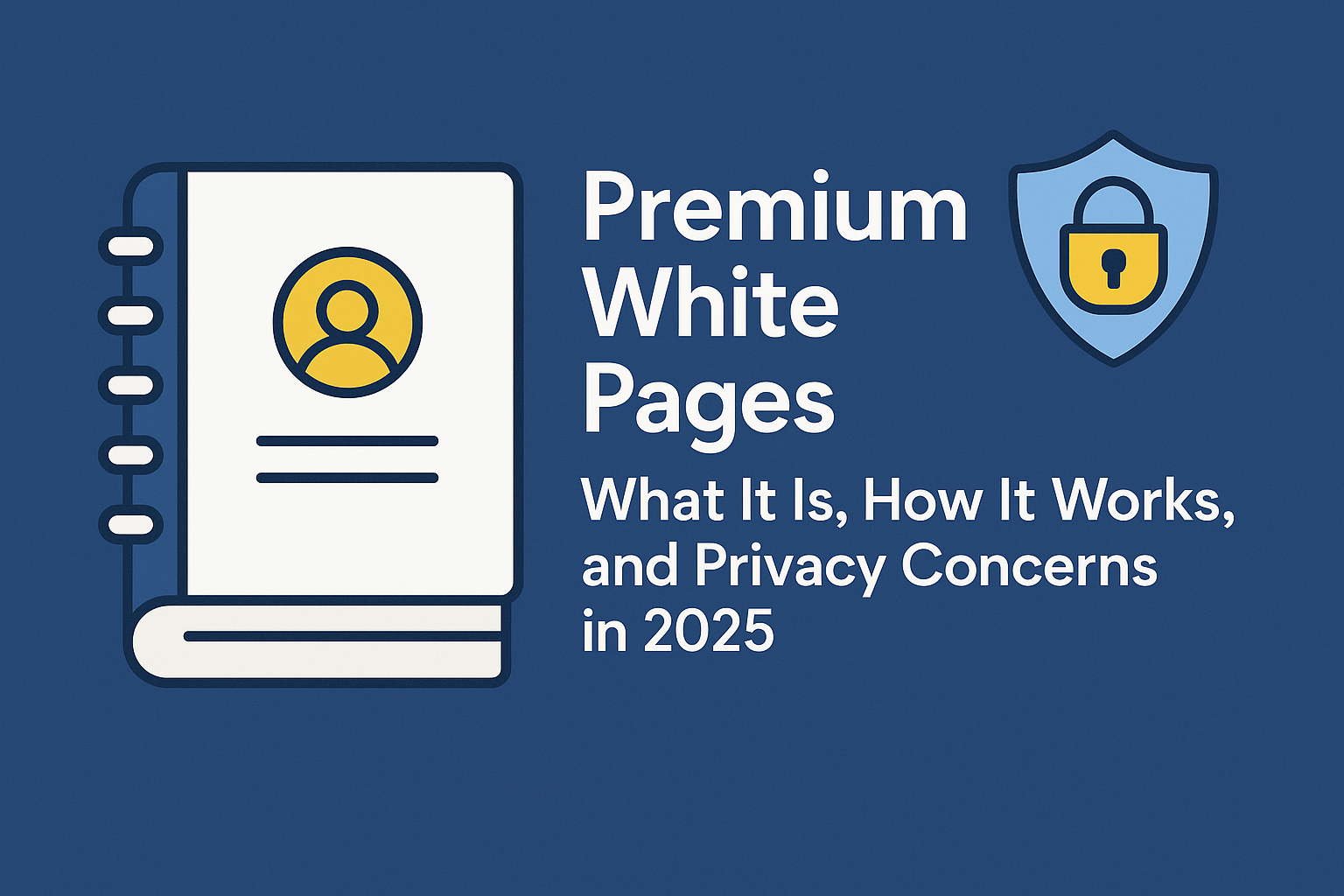Estimated reading time: 5 minutes
What is Premium White Pages?
Premium White Pages is a subscription-based service that expands on the traditional free White Pages directory. Instead of just listing names and landline numbers, it provides:
- Full contact information (home address, mobile numbers, email addresses)
- Relatives and known associates
- Employment and business history
- Property ownership details
- Geolocation data
Unlike the free White Pages, which primarily mimics the old-fashioned phonebook, the Premium version acts more like a data broker, aggregating details from multiple sources and packaging them into searchable reports.
How Premium White Pages Works
Premium White Pages collects information from various streams, including:
- Public records – property deeds, voter registrations, professional licenses.
- Telecom providers – landline and mobile carrier databases.
- Web scraping – crawling social media platforms, blogs, and forums.
- Third-party brokers – purchasing bulk datasets from companies that trade in personal information.
This aggregated data is then tied together under one individual profile, making it easy for subscribers to conduct a deep background check.
While marketed as a “convenience service,” Premium White Pages creates legitimate concerns about data security and identity misuse.
Features of Premium White Pages
Free Tier vs. Premium Tier
- Free Tier: Basic name, city, and listed phone number.
- Premium Tier: Expansive background reports, reverse phone lookups, and access to addresses.
Search Options Available
- Reverse Phone Lookup – Enter a number to find the name and address.
- Reverse Address Lookup – Identify who owns or lives at an address.
- Email Search – Uncover profiles linked to an email address.
- Business Records – Check ownership, corporate filings, and partnerships.
Subscription Model
Premium White Pages charges a monthly or yearly fee for access to the enhanced data.
Privacy Risks of Premium White Pages
The issue isn’t whether the data is accurate—it’s whether it should be available so openly. Key risks include:
- Identity theft – Hackers use published info for phishing and scams.
- Harassment and stalking – Publishing home addresses can endanger victims.
- Employment bias – Potential employers may access data outside regulated background checks.
- Reputation damage – Old or incorrect information stays attached to your name.
Why Premium White Pages Exists
Data accessibility is profitable. Businesses, marketers, and even private individuals rely on quick background data. Premium White Pages monetizes this demand by aggregating and reselling publicly accessible but difficult-to-compile records.
However, ease of access does not equal ethical use. The debate about balancing convenience with privacy remains unresolved in 2025.
Steps to Protect Yourself from Premium White Pages
1. Search for Yourself
Enter your full name, city, and state into WhitePages.com. Make note of each listing.
2. Submit Opt-Out Requests
Navigate to the Premium White Pages opt out form:
https://www.whitepages.com/suppression_requests
Steps:
- Paste the profile URL.
- Provide your email for verification.
- Confirm opt out via email link.
3. Remove from Other Data Brokers
Premium White Pages often repopulates its database through other brokers. Consider removing yourself from:
- Radaris
- Spokeo
- Intelius
This reduces the likelihood of reappearance.
4. Monitor Regularly
Set up Google Alerts for your name. This will notify you whenever a new page mentions you.
5. Mask Your Contact Information
- Switch to a P.O. Box or virtual mailbox.
- Use VOIP numbers (Google Voice) for public registrations.
Advanced Privacy Measures
Freeze Your Credit Reports
Prevent identity theft by placing freezes with:
- Equifax
- Experian
- TransUnion
Limit Social Media Exposure
- Hide addresses and phone numbers from profiles.
- Remove location tags from posts.
Use Encrypted Communication
Switch to ProtonMail or Signal to prevent data leaks.
Legal Options
In some states, residents can request removal of data under privacy laws (such as California’s CCPA).
Why DIY Opt-Out May Not Be Enough
- Opt-out processes are time-consuming and often require manual re-verification.
- Some removals only last 30–90 days before records reappear.
- Not all data brokers make the opt-out option clear or accessible.
That’s where professional help, like Remove Online Information, becomes essential.
How Remove Online Information Helps
Remove Online Information provides:
- Bulk opt-outs from data broker networks.
- Ongoing monitoring of your name and contact info.
- Suppression of cached or outdated listings.
- Tailored solutions for individuals, families, and businesses.
📌 Start protecting your privacy today: Visit Remove Online Information.
FAQ: Premium White Pages and Privacy
Yes. It compiles publicly available information, though its ease of access raises ethical concerns.
Submit an opt-out request through the suppression page, verify your identity, and monitor for reappearances.
Yes, its business model relies on data sharing.
No. You must also file removal requests with Google for cached results.
Yes, like most subscription services, activity may be logged.
No. Opt-out requests are free but time-intensive.
Yes. You can request corrections, but removal is the stronger privacy strategy.
Constantly. Opt-out requests may need to be repeated.
They are connected but not identical. Premium provides enhanced, paid features.
Combine DIY removals with professional services to ensure ongoing suppression.
Not entirely. Since it relies on public and commercial data, new records may still appear. Continuous monitoring is key.
Yes. Certain states allow for address confidentiality programs to hide sensitive records from directories like Premium White Pages.
Key Takeaways
- Premium White Pages provides detailed personal information that poses risks to privacy.
- Opting out is possible but requires persistence.
- Protect yourself by combining removal requests, legal protections, and monitoring.
- Professional services like Remove Online Information ensure lasting results.
Works Cited (MLA Format)
Federal Trade Commission. Data Brokers and Consumer Privacy. FTC, 2025, https://www.ftc.gov/.
Google. Remove Outdated Content. Google Support, 2025, https://search.google.com/search-console/remove-outdated-content.
National Conference of State Legislatures. Consumer Data Privacy. NCSL, 2025, https://www.ncsl.org/.
WhitePages. Suppression Request. WhitePages, 2025, https://www.whitepages.com/suppression_requests.
Electronic Frontier Foundation. Privacy and Surveillance. EFF, 2025, https://www.eff.org/.

